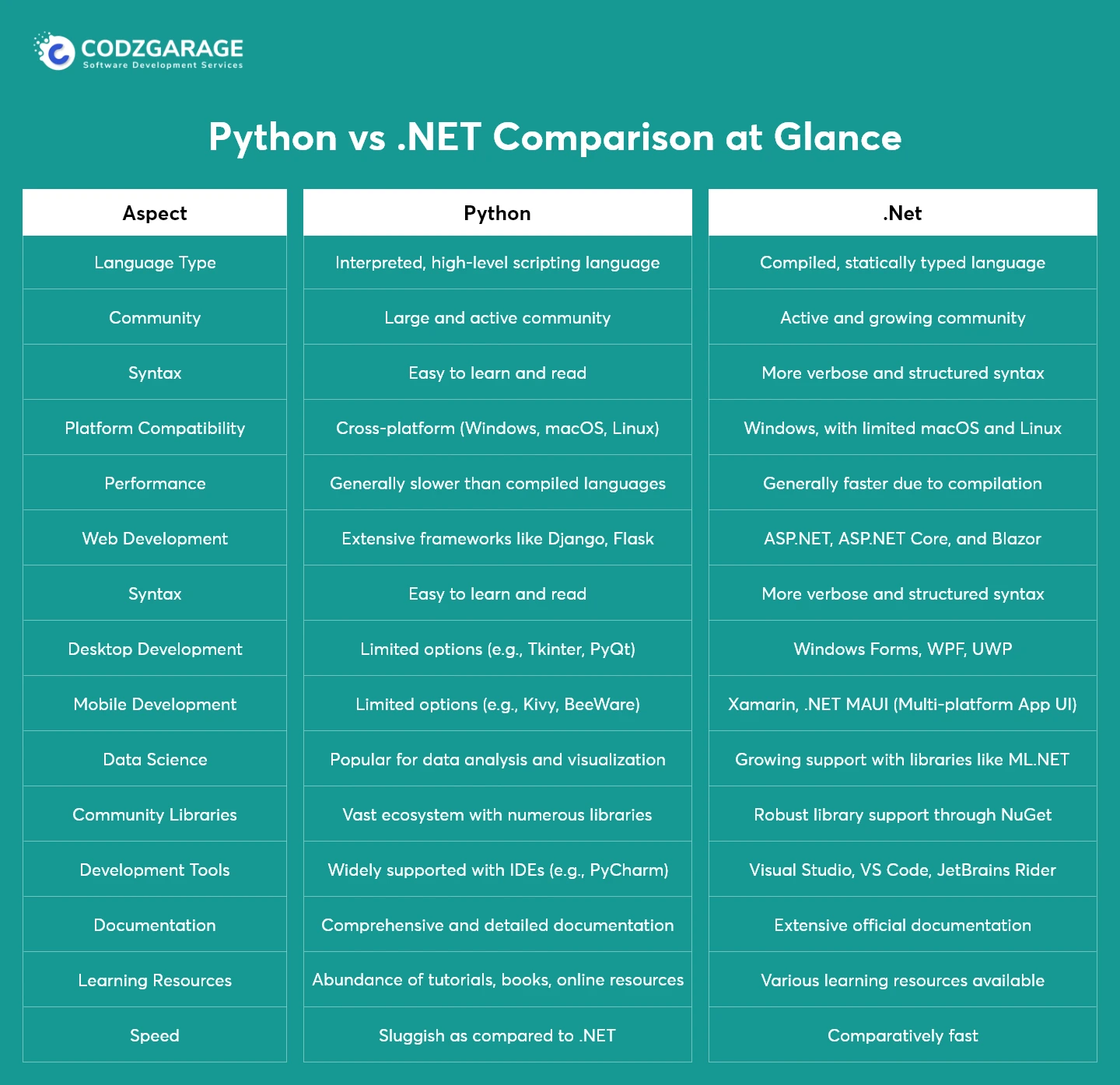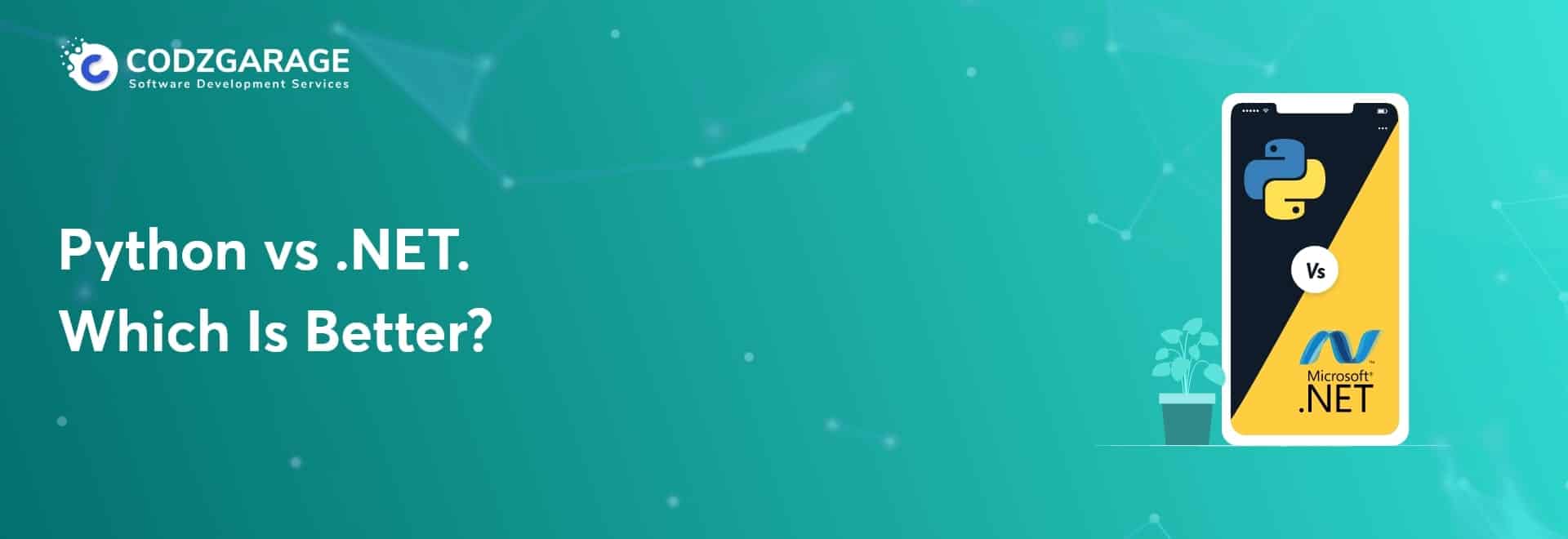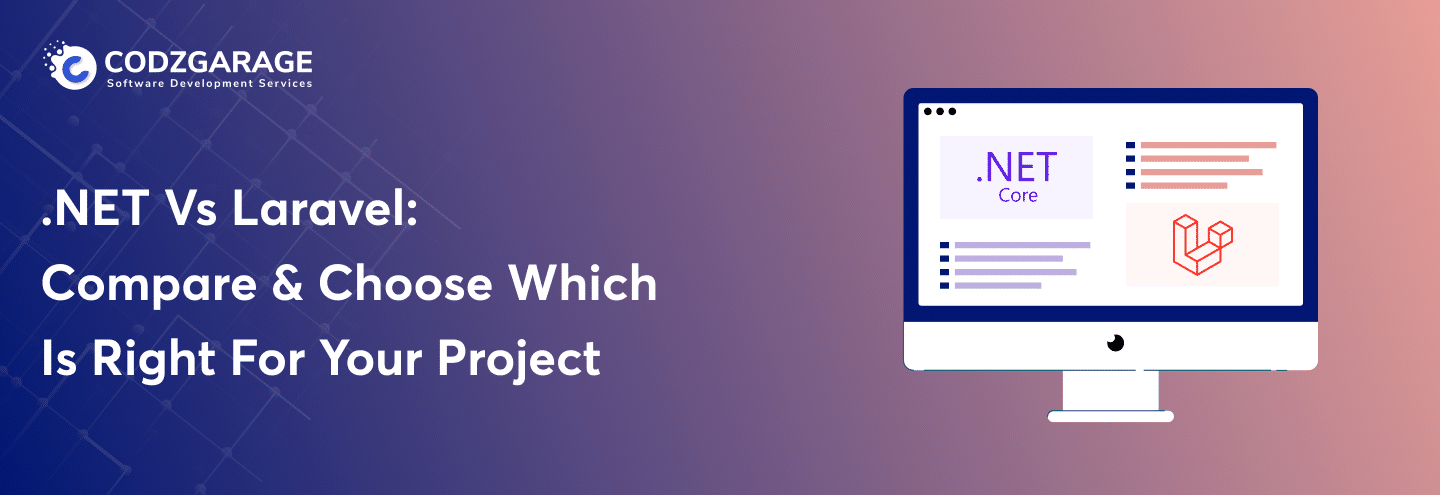-
4006
Python vs .Net: Which is Better For Your Project, And Why?
Are you looking to build an application from scratch or want to migrate your legacy system into the modern technology or platform? Find out the best comparison between Python vs. .NET or .NET Core to help you make a better choice.
Are you juggling with Python vs. NET? Not sure if the former or the latter is the right option for your project? The selection of technology, such as Python and .NET, is something you must be incisive and careful about when you choose one for software development. We have shorted this out with comprehensive analysis and comparison, giving you a clear understanding of what technology should be right for you. Let’s explore;
Are you planning to develop web applications for your enterprise using Python or .NET? As Python and .NET are used widely and can be excellent choices for what they do best. Basically, the selection of platforms goes through multiple aspects, such as;
- The quality of the codebase
- Type of applications it is suitable for
- What you want to build
- What you want to achieve with your project
- Python or .NET developers’ skills
And plenty of other aspects (we will discuss all of them in this article).
Indeed, the platform or programming language you choose will determine the success and failure of the project. You need to explore applications for Python and .NET to find if you really to choose one over the other Besides, your project requirement plays a vital role in the selection process. So, this Python vs. .NET comparison will help you understand which technology is suitable for your project.
We’ve come up with an explanatory guide of Python vs .Net, that contains an overview, the features, and a detailed comparison based on their advantages and disadvantages. This guide will let you know the nuances of these two allowing you to choose what’s better for you.
We’ve come up with an explanatory guide of Python vs .Net, that contains an overview, the features, and a detailed comparison based on their advantages and disadvantages. This guide will let you know the nuances of these two allowing you to choose what’s better for you.
Python vs .NET: An Overview
Before you focus on the .NET vs Python comparison, let us help you understand the basics of these two technologies separately. This helps you have a basic overview and select the right platform and programming languages with the utmost confidence. This is a common process when you have to choose any technologies, platforms, and programming languages.
What is Python
Python is a general-purpose, popular programming language that’s used to build a wide variety of applications. You can find plenty of applications for Python, though they are built for different purposes. Its design philosophy makes use of significant indentation and emphasizes code readability. Python supports various programming paradigms, for instance, object-oriented, structured, and functional programming.
The framework contains high-performance data structure, dynamic binding, dynamic typing, and many other features making it an excellent framework even for building complex applications. Python can expand itself to most operating systems and run code written in C or C++.
The ubiquity and competence to run on almost every system architecture make Python a universal language for software development.
Key Features of Python
- Python is convenient to code, maintain, read, and port.
- Support structured, functional programming along with object-oriented programming.
- A robust and standard library that’s also portable, hence, compatible with various platforms, for instance, Mac, Windows, and Unix.
- The framework is built under an open-source license.
- Supports automatic garbage collection.
What is .NET?
.NET is an open-source, performance-rich framework by Microsoft used to develop and run various types of well-functional web, mobile, and desktop applications. It’s a managed code execution environment that provides object-oriented tools like compilers, class libraries, debuggers, and so on for software development.
Dot Net development supports object-oriented programming) along with providing advanced features like security mechanisms (e.g., role-based access control), and so on. Millions of developers worldwide use .NET for building applications for businesses of all sizes. .NET is easy to learn and offers a rich set of features and functionality for creating a variety of applications.
Key Features of .NET
- Convenient Programming model
- Streamlined app development.
- Multi-Language Support.
- Portability
- Next-Level Security.
- Automated Resource Management.
Sky-High Your Business Growth with Apps Built Using .NET
Connect with our skilled .NET developers and get the best working experience with our transparent hiring policies.
Let’s connectThe popularity of Python and .NET
According to Google Search Trends, Python is going through quite a fluctuation while .NET is the constant. However, both works wonder, given the kind of project it is built with.

Python vs .NET Comparison at Glance
| Aspect | Python | .NET |
|---|---|---|
| Language Type | Interpreted, high-level scripting language | Compiled, statically typed language |
| Community | Large and active community | Active and growing community |
| Syntax | Easy to learn and read | More verbose and structured syntax |
| Platform Compatibility | Cross-platform (Windows, macOS, Linux) | Primarily Windows, with limited macOS and Linux support |
| Performance | Generally slower than compiled languages | Generally faster due to compilation |
| Web Development | Extensive frameworks like Django, Flask | ASP.NET, ASP.NET Core, and Blazor |
| Desktop Development | Limited options (e.g., Tkinter, PyQt) | Windows Forms, WPF, UWP |
| Mobile Development | Limited options (e.g., Kivy, BeeWare) | Xamarin, .NET MAUI (Multi-platform App UI) |
| Data Science | Popular for data analysis and visualization | Growing support with libraries like ML.NET |
| Community Libraries | Vast ecosystem with numerous libraries | Robust library support through NuGet |
| Development Tools | Widely supported with IDEs (e.g., PyCharm) | Visual Studio, Visual Studio Code, JetBrains Rider |
| Documentation | Comprehensive and detailed documentation | Extensive official documentation |
| Learning Resources | Abundance of tutorials, books, and online resources | Various learning resources available |
| Speed | Sluggish as compared to .NET | Comparatively fast |

Python vs .Net: A Detailed Comparison
As we did an overview of NET & Python, now is the time we explore them thoroughly so that we’ll be able to know which one will be the right technology for your app development.
Advantages of Using Python
-
General Purpose Programming Language
Being a general-purpose programming language makes Python the best choice for software development. The framework covers a variety of areas of expertise, for instance, machine learning, data science, and so on.
-
Easy to Learn & Use
Convenience in learning and utilizing make Python a preferred choice of developers worldwide for building groundbreaking applications. Python’s simple syntax allows Python developers to start projects timelessly. Moreover, being easy to learn and understand makes the framework user-friendly, especially for beginners aspiring to build software in a reduced amount of time and effort.
-
Next-Level of Productivity
Enhanced productivity is another advantage of Python. The simple nature of Python allows developers to concentrate on resolving problems with ample focus. Users don’t need to spend hours when it comes to an understanding the syntax and behavior of Python, leading to the accomplishment of more tasks.
Making use of Python, you can write code in any language, for instance, Java or JavaScript, and run them utilizing Python integrated development environment or command line tools.
Disadvantages of Python
Everything has perks and perils, and Python isn’t an exception. As we assessed the advantages, let’s see some stumbling blocks of using Python.
-
Speed
Python isn’t that fast compared to Java or C++. When you compare Java, you’d know that it can be an excellent choice, given the type of project it is used for. That means it won’t be the right decision to implement Python for processing a large amount of data. When it comes to handling high-performance computing, Python isn’t good at that either.
-
Memory consumption
Another disadvantage of Python is excessive memory consumption. Because it’s flexible to the data types, it has an excessive memory consumption and utilizes an elephantine amount of memory.
-
Runtime errors
There are a variety of errors with the language design that Python users often come across. Since Python language is dynamically typed, chances are there may be changes in the data types at any time. This is why it most often needs to get tested, and there can be errors in the language during runtime.
Furthermore, Python doesn’t provide any sort of graphical user interface like Java, which means you need to write code on your own if you want one in Python, which can lead to a time-consuming, more strenuous process.
Advantages of Using .NET
-
Multiple Platform Design
One of the biggest advantages of using .NET is that it capacitates you to write code capable of running on a variety of platforms. Moreover, the code is open-source; hence, it’s always up to becoming more sophisticated because of numerous continuous improvements.
-
Open-Source
.NET is a complete framework for executing comprehensive application development. The framework is an open-source platform, meaning anyone can conveniently avail the benefits of .NET and build groundbreaking applications. The framework consists of multiple components like .NET Core And Visual Studio IDE.
-
Cross-Platform
.NET Core is a part of .NET and is one of the top cross-platform frameworks for building high-quality applications. It is the lightweight version of this comprehensive framework that runs on MacOS X, Linux, and Windows. On the other hand, Visual Studio IDE is an integrated development environment that allows the creation of applications using C#, Visual Basic, and other languages supported by Visual Studio. However, this framework is widely used for web app development; there are various other frameworks and libraries, such as React and React Native, which you compare and use as suitable to your requirements.
Disadvantages of .NET
Like Python and other technologies, .NET also has some cons. Consider looking at the pointers below that show how choosing .NET over Python can’t be the right choice for your project.
-
Reduced Object-relational Support
Updates are essential and very common for any product. There comes the issue when updates restrict the previous version from getting released. Any changes in design, database, or both can cause a lack of support for the previous version.
-
Dependence on Supplier
.NET platform is developed, owned, and maintained by Microsoft, which means it owns complete superiority over this framework. Consequently, developers don’t have sole control over the app and must comply with Microsoft’s policies.
-
License Cost
No doubt, the .NET framework is open-source, but licensing can be expensive when the project is large and complex. Microsoft provides different tools to ease your work; however, working with the Visual Studio IDE can be expensive. As it costs you $539 per year, it may not be the right choice from a cost perspective.
Python and .NET Both Are Worthy in Depending on Projects
As a general-purpose programming language, Python focuses more on code readability with syntax that equals the English language. The language supports OOP (object-oriented programming) and is used for building web apps, web services, desktop GUI apps, etc. Furthermore, Python owns a dynamic typing system rather than a static that means; you won’t be able to explicitly declare the type of objects and variables you’re working on.
On the other hand, .NET Framework is an open-source framework that allows the creation of distributed systems in .NET languages, for instance, VB Scripts (basic visual script) and C#. The framework provides standard functionality across various platforms, including Windows Forms-based user interfaces, database connectivity via ADO Recordset objects, web-based service using ASPX files, SQL Server Compact Edition, and Databases such as SQLSserverCe++. The project can be outstanding given the skill set and the best practices of .NET core applied.
Final Thoughts:
Python is an open-source framework that allows users to use and modify it without spending even a single penny. Since there’s no need for licensing fees associated with the proprietary tools, Python is the right way to get started compared to other languages, for instance, Java and C++. On the other hand, .NET, too, has numerous advantages in store for its users. Before you head up to Python or .NET development company for your project, revisit this page and get the best results for your projects.
If you want to choose one of these two technologies, you better explore your requirements and implement one to your project that suits your needs best. Codzgarage is the leading software development and consulting service provider in the USA, offering a wide range of services and consulting for SMEs and enterprises. We have been in this sector for more than 11 years, and we understand every nitty-gritty of software development. So, connect with us if you need consultancy or want to build an application.
FAQs
Is Python better than .NET for web development?
Python, with frameworks like Django and Flask, offers a robust ecosystem for web development, making it popular for building scalable and dynamic web applications.
On the other hand, .NET provides ASP.NET and ASP.NET Core, which are powerful frameworks for web development with seamless integration into Microsoft technologies. The choice depends on factors such as project requirements, familiarity, and platform preferences.
Which language is more suitable for data science: Python or .NET?
Python has gained significant traction in the data science community due to its extensive libraries like NumPy, Pandas, and scikit-learn, making it a popular choice for data analysis, machine learning, and artificial intelligence tasks. While .NET has libraries like ML.NET for data science, Python’s ecosystem and community support give it an edge in this domain.
What are the main differences between Python and .NET?
Python is an interpreted, high-level scripting language known for its readability and simplicity. It has a cross-platform nature and a large community contributing to its extensive library ecosystem. On the other hand, .NET is a compiled, statically typed framework primarily used for Windows development. It offers performance advantages, strong integration with Microsoft technologies, and a comprehensive suite of development tools.
Which language has better job prospects: Python or .NET?
Both Python and .NET have strong job markets with ample opportunities for skilled developers. Python’s versatility and popularity in various domains like web development, data science, and automation contribute to a high demand for Python developers. .NET developers, on the other hand, have good job prospects, particularly in enterprise software development, Windows application development, and cloud-based solutions.
Can I use Python and .NET together in a project?
Yes, it is possible to integrate Python and .NET in a project. Python’s extensive interoperability options, such as IronPython, enable embedding Python code within .NET applications, allowing you to leverage Python’s strengths alongside the capabilities of the .NET framework. This combination can be beneficial when specific functionalities or libraries are better suited for one language over the other.
Hire
.NET DevelopersOur Expertise
- Quality Work
- Deadline Commitment
- Cost-Effective






 Kevin Bhut
Kevin Bhut 







